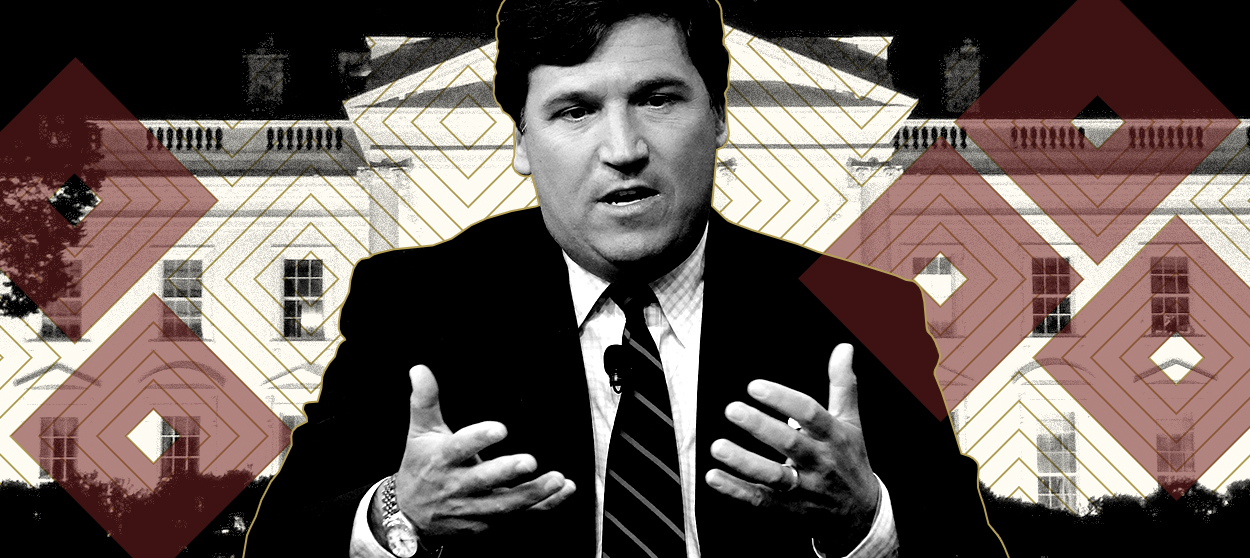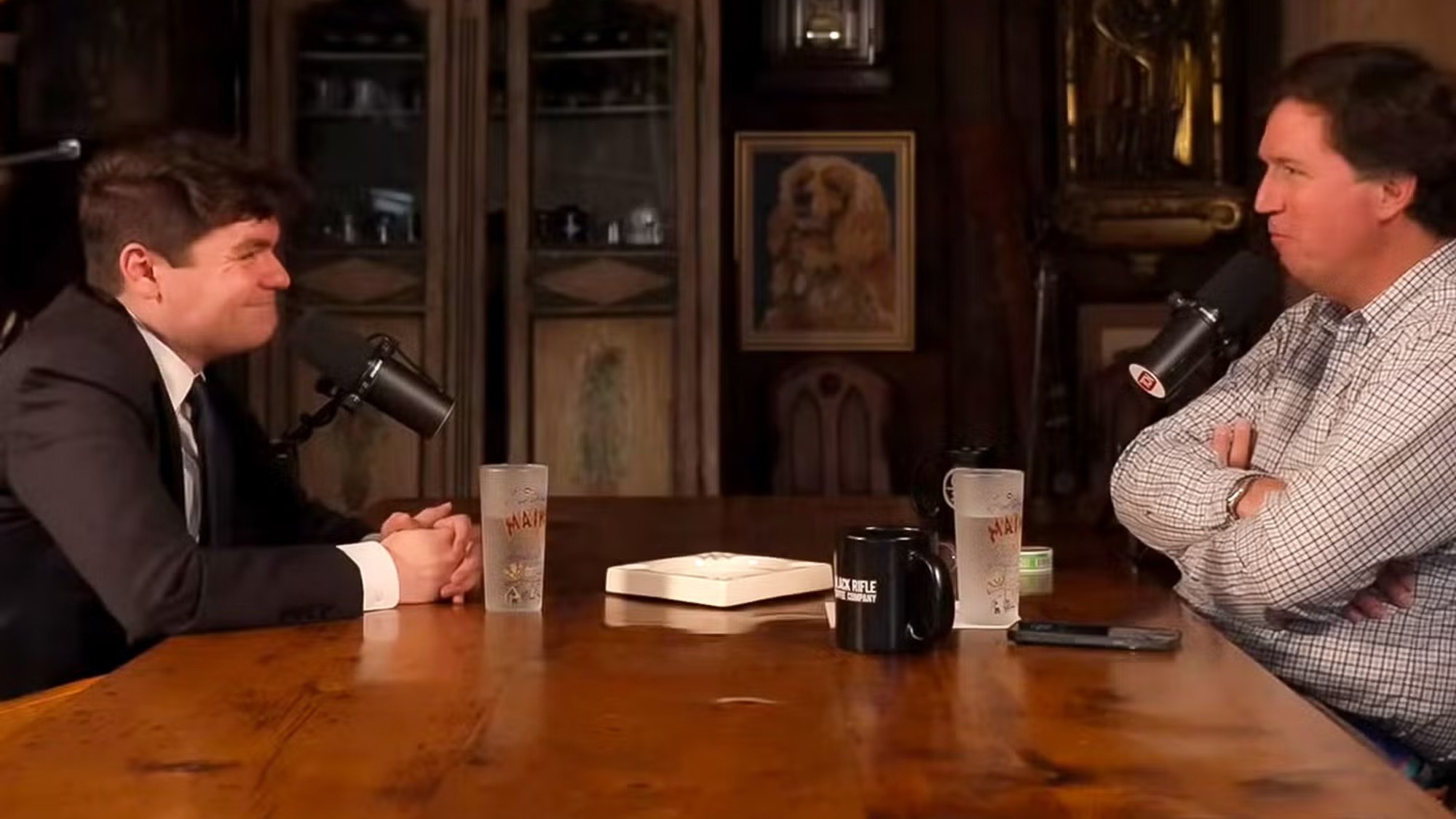Tucker Carlson for president?
Why the Fox News talking head could be the future of the Republican Party


A free daily email with the biggest news stories of the day – and the best features from TheWeek.com
You are now subscribed
Your newsletter sign-up was successful
It makes sense for pundits and politicians to be focused on the presidential election staring us down a mere 18 months in the future. But that's not where the real action is, at least on the right.
Whether President Trump wins or loses his bid for re-election in 2020, the moment of truth awaits us four years after that. That's when the forces of bitterness and discontent that Trump tapped into and unleashed in 2016 are most likely to produce a full-scale ideological realignment of the Republican Party.
And the man who may well be best positioned to catalyze that transformation — the man most likely to be the GOP nominee in 2024 — is none other than primetime Fox News talking head Tucker Carlson.
The Week
Escape your echo chamber. Get the facts behind the news, plus analysis from multiple perspectives.

Sign up for The Week's Free Newsletters
From our morning news briefing to a weekly Good News Newsletter, get the best of The Week delivered directly to your inbox.
From our morning news briefing to a weekly Good News Newsletter, get the best of The Week delivered directly to your inbox.
I have no idea if Carlson harbors political ambitions. Certainly his cable news gig has made him rich and famous. He may not aspire to be president, or have the hunger and stamina required to launch and sustain a run for the White House. What I do know is that the future of the Republican Party, and maybe the future of American politics as a whole, lies in the direction he's been pushing on his show over the past few months.
Trump's 2016 presidential campaign was an incoherent mess of ideas. It combined racist and nativist appeals with attacks on Reaganite orthodoxy on immigration, trade, foreign policy, and infrastructure and entitlement spending, while also toeing the standard GOP line on tax cuts, abortion, and Federalist Society-approved judicial appointments.
Trump's presidency has mixed in bits of most of these items, but it's the standard-issue Republican priorities — tax cuts, reflexively hawkish foreign policy, and the appointment of conservatives to the federal courts — that have taken the lead. The rest, from immigration and trade to infrastructure and entitlements, has been pursued haltingly at best and in many cases ignored altogether.
That's where Carlson comes in.
A free daily email with the biggest news stories of the day – and the best features from TheWeek.com
Sensing that Trump had begun but failed to follow through on a process of shifting the GOP in the direction of becoming what ex-Trump adviser Stephen Bannon used to call a "worker's party," Carlson decided in January to give that process a push. Delivering an extended monologue that amounted to what one liberal commentator has aptly described as "an indictment of American capitalism," Carlson assailed Republican office holders for encouraging sociocultural trends (like the outsourcing of jobs) that have enriched big business while decimating communities across the country. Over the following days and weeks, conservative intellectuals and Republican policy mavens were consumed with hashing out the issues raised by the diatribe. (The much-debated smackdown between conservative pundits Sohrab Ahmari and David French over the past week is in some respects just the latest aftershock from the January earthquake.)
Then, on Wednesday evening of this week, Carlson returned to the theme. He began by posing a series of provocative questions:
What if the Republican leadership here in Washington had bothered to learn the lessons of the 2016 election? What if they'd understood, and embraced, the economic nationalism that was at the heart of Donald Trump's presidential campaign? What would the world look like now, two-and-a-half years later?
From there, Carlson began quoting an unnamed public figure denouncing companies that "wave the flag, but … have no loyalty or allegiance to America." He went on quoting:
Politicians love to say they care about American jobs. But for decades, those same politicians have cited 'free market principles' and refused to intervene in markets on behalf of American workers. And of course, they ignore those same supposed principles and intervene regularly to protect the interests of multinational corporations and international capital. We can navigate the changes ahead if we embrace economic patriotism and make American workers our highest priority, rather than continuing to cater to the interests of companies and people with no allegiance to America.
Then came the big reveal: The person Carlson was quoting was none other than left-leaning Democratic presidential candidate Sen. Elizabeth Warren (Mass.), whom Carlson praised for sounding "like Donald Trump at his best."
Carlson is trying to lead the Republican electorate from his Fox News perch to a right-wing embrace of the economic patriotism Warren is currently advocating from the left. He'd be uniquely well placed to take this platform all the way to the White House in 2024. Which raises the question of what will separate the left and right versions of the economic populist message. More concretely: Couldn't a successful 2020 presidential run for Warren render the Carlson project of reorienting the Republican Party electorally superfluous?
Not necessarily. The culture-war issues that, in the Trump era, have metastasized on both sides of the political spectrum will continue to be a point of sharp contrast between the parties, no matter how economically populist they each become. Those issues obviously include reproductive and LGBT rights, but increasingly they also touch on political correctness, immigration, and race.
Carlson made a point in his recent plug for Warren's economic agenda of praising her for remaining silent about "identity politics" and for avoiding "hysterics about gun control or climate change" and skipping a "lecture about the plight of transgender illegal immigrants." But of course the reason why Warren declined to discuss these topics (let alone mock and snidely dismiss them, as Carlson did) is that most of them have nothing to do with the economic priorities she aimed to summarize in the document Carlson was quoting. (Climate change does, in fact, play a large role in her policy agenda.) Any time Warren does discuss these subjects, she comes down firmly and unambiguously on the progressive side of each.
Carlson, by contrast, intersperses his indictments of capitalism with demagogic segments about the filth spread by immigrants, the horrors of diversity, and even the (wholly imaginary) threat of gypsies.
That is the kind of economic patriotism Carlson could end up hocking in a future presidential run — one that combines a more articulate version of Trump's nativist xenophobia with the kind of sweeping attack on big business one typically associates with the far left and an equally savage assault on the moral "libertinism" of decadent liberal elites.
Which version of economic patriotism will have greater electoral appeal in 21st century America, Elizabeth Warren's or Tucker Carlson's? Over the next few election cycles, we're likely to find out.
Damon Linker is a senior correspondent at TheWeek.com. He is also a former contributing editor at The New Republic and the author of The Theocons and The Religious Test.
-
 How the FCC’s ‘equal time’ rule works
How the FCC’s ‘equal time’ rule worksIn the Spotlight The law is at the heart of the Colbert-CBS conflict
-
 What is the endgame in the DHS shutdown?
What is the endgame in the DHS shutdown?Today’s Big Question Democrats want to rein in ICE’s immigration crackdown
-
 ‘Poor time management isn’t just an inconvenience’
‘Poor time management isn’t just an inconvenience’Instant Opinion Opinion, comment and editorials of the day
-
 The billionaires’ wealth tax: a catastrophe for California?
The billionaires’ wealth tax: a catastrophe for California?Talking Point Peter Thiel and Larry Page preparing to change state residency
-
 Bari Weiss’ ‘60 Minutes’ scandal is about more than one report
Bari Weiss’ ‘60 Minutes’ scandal is about more than one reportIN THE SPOTLIGHT By blocking an approved segment on a controversial prison holding US deportees in El Salvador, the editor-in-chief of CBS News has become the main story
-
 American antisemitism
American antisemitismFeature The world’s oldest hatred is on the rise in U.S. Why?
-
 The GOP: Will it welcome antisemites?
The GOP: Will it welcome antisemites?Feature That Carlson would grant Fuentes access to his massive audience is proof that his hate ‘is entering the MAGA mainstream’
-
 Has Zohran Mamdani shown the Democrats how to win again?
Has Zohran Mamdani shown the Democrats how to win again?Today’s Big Question New York City mayoral election touted as victory for left-wing populists but moderate centrist wins elsewhere present more complex path for Democratic Party
-
 Nick Fuentes’ Groyper antisemitism is splitting the right
Nick Fuentes’ Groyper antisemitism is splitting the rightTalking Points Interview with Tucker Carlson draws conservative backlash
-
 Millions turn out for anti-Trump ‘No Kings’ rallies
Millions turn out for anti-Trump ‘No Kings’ ralliesSpeed Read An estimated 7 million people participated, 2 million more than at the first ‘No Kings’ protest in June
-
 Ghislaine Maxwell: angling for a Trump pardon
Ghislaine Maxwell: angling for a Trump pardonTalking Point Convicted sex trafficker's testimony could shed new light on president's links to Jeffrey Epstein
